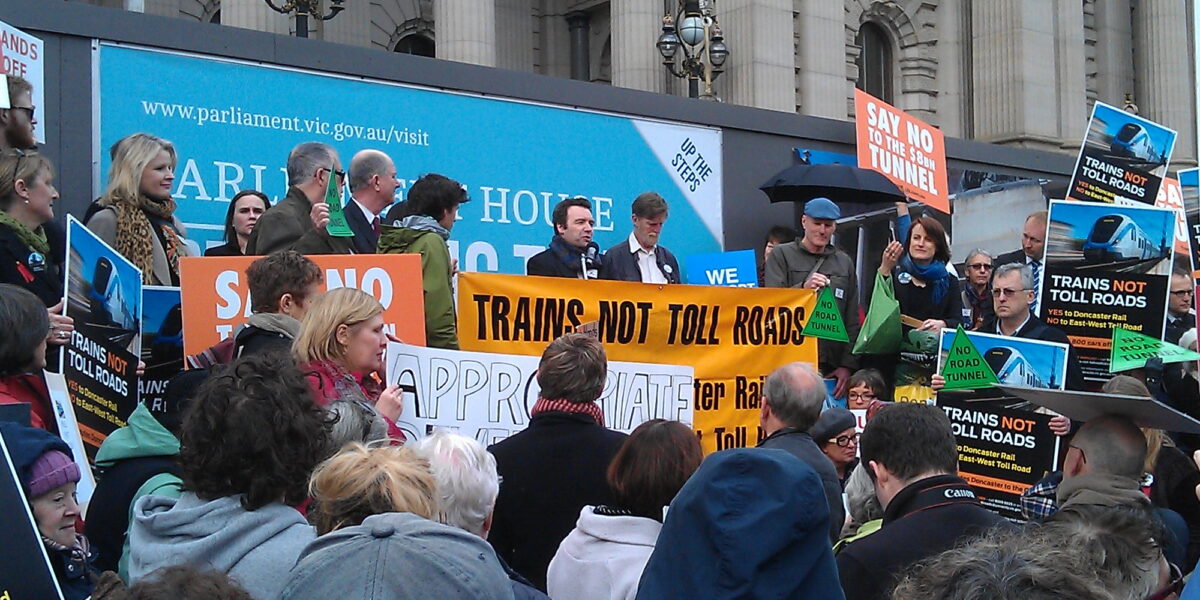When anything really big happens, it’s often a complex set of circumstances that leads to it.
So it was with East-West Link – the inner-city motorway that sprang seemingly from nowhere to be a top priority of the Baillieu/Napthine government, only to be cancelled after they lost power in 2014.
James C Murphy has written a new book on the topic. The publisher was kind enough to send me an advance copy, and it’s fascinating.
For PTUA members who attended the meeting with James, he’s an entertaining speaker who presented the book as a kind of Whodunnit.
The book charts the background of EWL, the concept of which was bubbling away for a long time. Then it got pushed into the hands of the State Coalition Government when they were looking around for a big project to get their teeth into.
Who convinced the government to run with it? Those of us in public transport advocacy sometimes mutter about the road lobby, and the dark forces that push these new mega-road projects. The book names specific key figures in this case: Ken Mathers and the (since disbanded) Linking Melbourne Authority. Mathers worked tirelessly to shape the EWL project as a solution to a problem the government felt it had to fix.
To be the top of the agenda also required the most senior leaders in government to be keen, and after what was widely perceived as a period of inaction, both Baillieu then especially Napthine picked it up and pushed it hard as they approached the 2014 election.
The book then charts the forces fighting against the project, of which there were many:
Opposition to the link was not just fierce; it was also hydra-headed. It was uncoordinated, following multiple strategies all at once, sometimes contradictory ones, making it incredibly difficult to combat.
As the opposition (and The Opposition) mounted, the Napthine government became more desperate to push the project through no matter what, resulting in the side letter booby trap.
Parts of the book also explore the theory vs practice of this type of three-dimensional chess, and the author has interviewed many of the key players involved.
I thought I knew a lot of this story, but learnt a lot more detail from reading the book. It’s all really interesting, and those interested in politics or involved in activism (transport or otherwise) are likely to find it fascinating how a huge project was knocked off its perch.
The project is not totally dead of course – it still lives on to this day in the hearts of Coalition politicians. They’ve still got a web site promoting it.
And the book? A political page-turner – very much recommended.👍🏻
- The book will be published in July. More details: The Making and Unmaking of East-West Link and there’s an extract available
- James Murphy’s article from 2021 for Inside Story: The chant of East West Link
- PTUA members can access a video of (most of) James’s recent presentation and Q+A. PTUA membership is only $45/year or $4.50/month – bargain!



4 replies on “Who killed East-West Link?”
Thanks for highlighting the book Daniel. Interesting that since this contract has been torn up, there have been a myriad of roads built (and widened) by the Andrews governement, yet, no opposition and protests and folks trying to block the works. Which is great for the car folks of Melbourne. Especially the new link being built for the Eastern Fwy to get to the airport quicker. No opposition. Trees chopped down etc. No signs. No opposition, no protests….yup.
@James, yep, agree. I think in terms of increasing car dependency, the North East Link and West Gate Tunnel are just as bad… but because they don’t involve lots of home acquisition and cutting through a much-loved park, they’re not seen as being quite so evil.
[…] A Napthine promotion of their transport projects to residents in the Kingston and Glen Eira areas. The text is all about local projects, but the graphic is all about their signature project, East West Link – it’s very difficult to see how that would have benefitted or affected most people in the area – and of course it had numerous other flaws. Thankfully EWL was cancelled. […]
[…] protestors gathered on the steps of State Parliament to rail against the East West Link, which was eventually cancelled by Labor after the […]